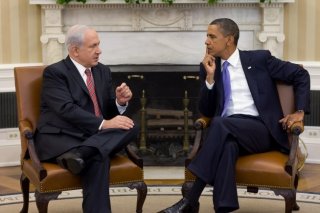U.S.-Israeli Ties are Worth Salvaging
Obama and Bibi's personal feud should not impede bilateral relations.
Few bilateral relations are as personally fraught on the leadership level as the current relationship between President Obama and Prime Minister Netanyahu. Foreign leaders have rarely gone so far in modern US political history to directly interfere in the domestic affairs of an American President, most notably visiting Washington without consulting the White House to actively lobby Congress to oppose the President’s foreign policy initiatives and in the 2012 presidential elections, to all but embrace Obama’s electoral opponent, Mitt Romney.
At the same time, few US Presidents have publicly shown complete displeasure for a foreign leader of a long-standing ally (ironically, Netanyahu has been the ire of a few US Presidents in earlier stages of his career as TNI’s managing editor Zachary Keck illustrated). Such sentiments were summed up well when a senior administration official described the Israeli Prime Minister as a “chickenshit.” Ron Dermer, the Israeli Ambassador to the United States, is persona non grata with the Obama administration. Netanyahu’s campaign to fire up the far right reached its nadir in the final hours when the Prime Minister, ostensibly trailing in the flawed Israeli public opinion polls, rejected the two-state solution, a core plank of the U.S.’s decades old peace initiatives in the region. His use of racist overtones in his campaign and his embracement of controversial settlement developments further stoked the ire of the U.S. administration.
Herzog’s lead was welcomed in the White House with a sigh of relief that for the final years of Obama’s presidency, the president may have a leader who he could personally work with and one who would be more amenable to the administration’s negotiations with Iran and their stalled Israel-Palestine peace negotiations. Netanyahu’s surprise sweep of Israel’s elections, which all but guarantees him another term as Prime Minister, left many in the administration disappointed. This sour mood was publicly reflected when President Obama declined to call Prime Minister Netanyahu to congratulate him.
Administration officials suggesting that Obama may pursue a harder line against Prime Minister Netanyahu in his final years in office, including potentially supporting efforts in the UN calling for a two-state solution (in contradiction of the administration’s previous efforts to block international efforts to force a two-state solution, not in the context of negotiations with Israel and Palestine) and plans to delegate interactions with Netanyahu to his secretary of state or vice president, underscore the reality that Obama has become fed up with his Israeli counterpart and will likely not make any effort to improve this relationship. These differences will intensify if a P5 + 1 deal is reached that Netanyahu perceives as not compatible to Israel’s interests.
However, it would be a mistake to allow this relationship to be mired by personal differences and to loose sight of the larger strategic importance of the bilateral relationship between the U.S. and Israel. Instead of finding new ways to antagonize the prime minister, Obama should seek to take the higher ground and keep the relationship from becoming mired by personal differences. Instead, it should be grounded on where the U.S. and Israel could more effectively cooperate on common strategic issues.
Importantly, such initiatives should back away from the temptation to use the UN to pressure Netanyahu to re-embrace the Two State Solution. As Netanyahu has accurately pointed out, Hamas isn’t committed to a peace process. For negotiations between Washington, Jerusalem, and the PLO to find common ground, which takes in account the will of the Israeli electorate, would be a more effective strategy to preserve the Two State Solution and advance U.S. interests. While it’s unlikely that the peace process can be revived in any meaningful way in Obama’s last two years in office, a critical mistake would be to allow the Madrid and Oslo accords’ precedents unravel. Netanyahu’s own post-election statements about supporting a two state solution are a positive step, but have so far done little to ease the White House’s concerns about the prime minister’s commitment to this process.
Equally, while it’s unlikely the U.S. and Israel will see eye-to-eye on any Iran nuclear agreement that is signed, it would be a mistake to not invest diplomatically in efforts to try to reduce Israel’s concerns about any such deal. Their bilateral relationship will become even more consequential in the case that such a deal is not reached or falls apart. The U.S. and Israel also have common strategic interests in preserving the stability of the Jordanian monarchy, preventing the spread of Syria’s civil war out of its borders, and the security and stability of Egypt. Finally, both Israel and the United States have a common interest in countering-Iran’s efforts to advance its interests at the expense of their own interests and those of Egypt and the Gulf States.
The stakes in the region are too high for both leaders to allow a difficult personal working relationship to compromise a broader strategic relationship, which admittedly, is being by strained by deep differences on strategic issues. While U.S. and Israeli national interests may not always perfectly align, there are more common national interests than differences. Those differences shouldn’t be magnified to such an extent that they compromise this relationship and both states’ commitments to each other’s broader security and prosperity.
Andrew J. Bowen, Ph.D. is a Senior Fellow and the Director of Middle East Studies at the Center for the National Interest.

